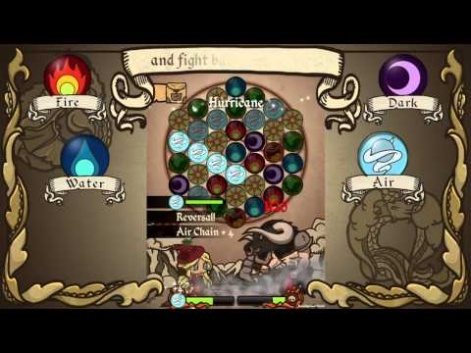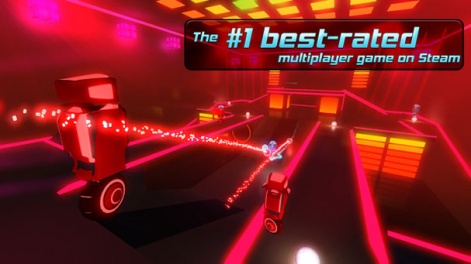Indie developer Erik Asmussen (82Apps) recently "gave up" on iOS deciding, instead, to focus on PC games.
His reasons were numerous: meticulous App Store process, too much risk, not enough reward, and the hard sell of the mobile market combined with its winner-takes-all mentality.
Asmussen came to this decision after his game PWN: Combat Hacking was featured by Apple on its App Store. He presumed the spotlight would result in a dramatic increase in revenue. But finding only disappointment, Asmussen became disillusioned with the promise of the App Store, hence his turn to PC.
Since then, he has released his multiplayer shooter Robot Roller-Derby Disco Dodgeball on to Steam Early Access, and seen more success. This led to Asmussen praising PC as a sweet spot, particularly for indie games, in a recent interview with Gamasutra.
"On PC you can release alpha builds, post a webplayer on your site, get YouTube attention, give out tons of keys, and build up a community of fans over a long period of time," Asmussen said.
"As a result, Disco Dodgeball has significantly outperformed any of my mobile games - and it's not even released yet."
As we have our Indie Mavens to hand, we thought to ask them what they thought of Asmussen's attitude towards both the PC and mobile markets. These was the questions we asked them:
"Do you agree with Asmussen's notion that mobile games are a "hard sell" and have a 'winner-takes-all' market?
Is PC/Steam now the sweetspot for indies making core games?"
I personally don't find mobile games valuable. I have bought a few, and rarely play any of them. Hoplite is the only game that I will continually boot up, and have been for years. Mobile gaming, perhaps because of the platforms that they are on, feels frivolous to me.
Mobile gaming feels frivolous to me.Shawn Allen
PC is the marketplace where independent games can find success or drown, whatever, but it seems far more likely that you'd do well than on mobile. Consoles hold that "I'm on Playstation SON" weight, and have their own notable successes.
Mobile can do fine, of course, and I've seen a lot of out-of-nowhere successes happen - but I'd rather not try to market where I don't even want to purchase, so no mobile for me.
Also I can't imagine a multiplayer shooter of sorts being a fit for mobile, either.

Jon's focus is on content, working from the initial outline, through the development of the authoring tools, to the writing and scripting of final content.
Previously, Jon was a lead designer at Sony Computer Entertainment Europe, and before that a secondary school teacher, so he loves to talk. He's a published author of short stories and over a decade's worth of award-winning interactive fiction.
I prefer playing on mobile platformsJon Ingold
It's the same old story - discoverability is almost impossible on all digital platforms, but on mobile, the average price is so low that you need to be in the top tier to break even.
That's pretty punishing. But there will, of course, always be space for good games on mobile and people willing to buy them. It's just a very competitive space.
Speaking personally, I prefer playing on mobile platforms - PCs feel too much like work for me, and the control schemes are almost always somewhere between cryptic and plain ugly. WASDwhat?
I don't think it matters if your game is 'core', 'casual' or otherwise, what matters is that you know your audience and you communicate with them. That can be via Early Access, social media, forums and an App Store feature.

With our mobile game [Glyph Quest], we built up a community through the Touch Arcade forums, for example. I think the problem for a lot of developers going indie (and I include myself in this) is how much the marketing process is undervalued.
It doesn't matter what platform your game is on (or how good it is) if no one knows that it is there.
Like many indies, we are looking for new opportunities outside of the traditional marketplaces.Dan Menard
Mobile has the same discoverability problem that all digital platforms have, but as Erik pointed out in the article, the prices are so low that it makes it a very hard sell for indies.
More and more devs are turning to free-to-play as an answer to this problem, but that is like betting on the high-stakes table.
You can make a killing if you hit the right formula, but if you make a mistake, expect a very negative return.
Like many indies, we are looking for new opportunities outside of the traditional marketplaces. Each platform has a cycle, and when one gets saturated like the App Store, the platform holders hold all the power and the devs continue to lose ground.
I do agree with Leanne as well. Marketing is absolutely critical no matter what platform you are on. I commend Steam for creating more and more tools for devs to interact with their players.

Mobile games have to be designed natively for mobile.
The idea of "core" games comes from an era when the only way to play games was to sit down in front of a big screen for a long period of time... but having little screens in our pockets changes all that.
Having a game that is pick-up-and-play is key, but it's more important to be able to put DOWN the game at any moment.
Challenging that idea and succeeding financially are almost mutually exclusive.
I find the idea that PC is an "easier" market than mobile somewhat misleading. It's like saying lifting 10,000lbs is easier than lifting 20,000lbs.
Technically it is true, but both are ridiculously challenging.
As Asher states/implies, it's all a function of the type of games you want to develop and the audience you aim to reach. Some game concepts would be impossible to market on Steam, others impossible on mobile.
Shoehorning an idea onto the wrong platform rarely works out in a devs favor.
Shoehorning an idea onto the wrong platform works out sometimes. Though, yeah, on mobile, going against "what a mobile game should be like" puts you at a big disadvantage.
Like Shawn said, it's really hard to imagine Disco Dodgeball working out on mobile.

PC has a bunch of advantages going for it, including much higher price points. PWN was $3, and Disco Dodgeball Early Access is $10 - over triple; massive difference.
Coverage for PC is also generally much more effective, if you can get it.
People more commonly use review sites as purchase recommendations versus mobile, and most YouTube/Twitch streamers still shy away from mobile.
With Steam being much more open now and stuff like itch.io existing, I'd mostly recommend PC to new developers.



























